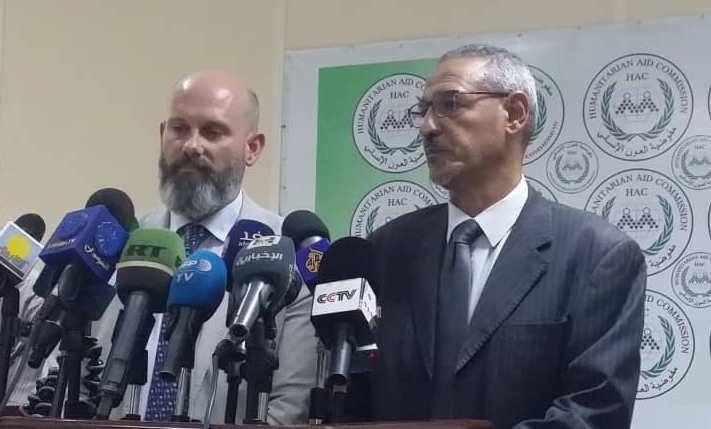Sudan accepts UN humanitarian proposal for the Two-Areas

September 27, 2018 (KHARTOUM) – Sudan’s Humanitarian Aid Commission (HAC) Thursday agreed on the UN initiative to deliver humanitarian assistance to civilians in the rebel-controlled areas in the Blue Nile and South Kordofan states.
In a press conference held in Khartoum, HAC General Commissioner Ahmed Mohamed Adam made the government official declaration adding they received the initiative earlier this year for the first time and was renewed last June.
He further said that they delayed their response because they were waiting for the SPLM-N’s response to the U.S. proposal which is part of the initiative.
Khartoum refuses the delivery of relief from outside the country to the rebel areas as it is part of the rebel demands. Also, the government wants to oversight food distribution in the rebel-held areas fearing that rebel fighters benefit from it.
To overcome this hurdle the American Administration late in 2016, proposed to transport by plane medical humanitarian assistance to the rebel areas through the U.S. humanitarian agency USAID. But the SPLM-N insisted on its request for the delivery of 20% of the humanitarian aid from outside Sudan through Ethiopia.
Following the split of the SPLM-N into two groups last year, the SPLM-N led y Abdel Aziz al-Hilu rejected the whole discussion on this respect.
The SPLM-N al-Hilu Secretary General Amar Deldoom said that they want the humanitarian assistance to be delivered through internal and external corridors as Bürgenstock agreement signed with the government in 2002.
The United Nations World Food Programme (WFP) Country Director in Sudan Matthew Hollingworth who participated in the press conference with HAC top official called on the SPLM-N to approve the UN aid initiative.
The details of the latest initiative are made public but they seem similar to a former plan prepared b a tripartite committee including UN, African Union and the Arab League providing that the humanitarian assistance will be delivered from Sudan after its control by the Sudanese authorities and its distribution will be monitored by UN, AU and Arab observers to ensure that the rebels will not get it.
Adam called on the SPLM-N to accept the initiative and coordinate in order to facilitate the delivery of humanitarian aid to civilians in line with the arrangements to be agreed with the UN and its partners.
He accused the SPLM of rejecting all the humanitarian initiatives, and insist that aid is delivered directly from external stations without going through any governmental process.
The SPLM-N officials in the past told the mediation they insist on the external stations because they want to have a humanitarian corridor to ensure the transportation from the landlocked rebel-areas of ill or wounded fighters to outside the country for treatment.
(ST)
